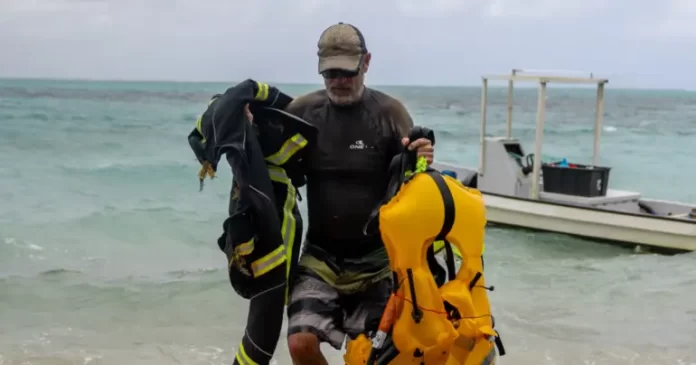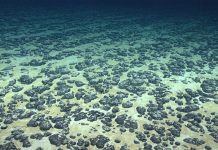Oil can be seen floating on top of the sea where the ill-fated HMNZS Manawanui sank on Sunday morning.
An environmental disaster looms that could affect the livelihoods of villagers in the area.
Along with the oil, rubbish and debris from the wreck are also floating on the ocean threatening marine life, food sources and tourism in the area.
There is also concern that the palolo season will be impacted as people fear they will be unable to catch any this year.
“The sea is our bread and butter,” Faatasiga Ituau of Sa’anapu told the Samoa Observer as he looked out to the ocean shaking his head in disbelief.
The New Zealand naval vessel ran aground on the Southwest Coast of Upolu on Sunday morning with 75 crew members safely rescued including three receiving minor medical assistance.
A day after the unrecoverable ship sunk into the ocean, nearby villages and tour operators didn’t wait for the authorities to clean up the debris and items from the sunken ship.
Many villagers who went out to sea confirmed seeing uncontained fuel in the ocean and debris littered everywhere.
Ituau said he was at sea on Sunday afternoon with other men and managed to pull to shore a life raft used during the rescue operation abandoned on the reef.
He said one of two dispatched boats on the HMNZS Manawanui was still sitting out at sea and was told that a New Zealand team would be clearing it up.
“The fuel smell is strong at night and if you go out further it is visible,” said the Saanapu resident.
“Our family like many others from our village and neighbouring villages live off the sea. This is a tragedy for our people and no amount of money can repair the damages to the marine life.”
Offshore Adventures tour operator, Brent Ross went out with his boat on Monday morning to assess the situation for his guests who were scheduled to explore the popular surfing spot in the area.
“It is pretty bad out there with fuel washing up in the lagoon, it’s an environmental disaster – unbelieving,” said Ross.
The tour operator is familiar with the area where the ship sank. He said it was a very popular surfing spot for tourists.
He suspects the ship might have struck the corner of the reef on the west of Siumu pointing to a map of the area.
“The fuel is going all the way through this reef, and it is one of Samoa’s best surf spots.
“It is just going to destroy it and hopefully not permanently, the environmental impact is pretty severe.”
Ross picked up some of the debris out at sea including first aid kits, multiple five-litre gallons containing chemicals, packages of food items, lifebuoys, life vests and other equipment.
He had called in the police to return the items. Samoa Observer confirms other villagers also returning equipment to the Lotofaga police post.
The tour operator expressed concerns about seeing no salvaging teams to contain the leaking fuel and clean up the rubbish on shore.
A few fishermen from nearby villages were also seen from a distance in their fishing boats collecting rubbish from the sea.
A New Zealand defence force member and international crew member for Qantas Group, Jeff Sione of Tafitoala also expressed his grave concerns with the Manawanui incident.
He frequently returns home to help his family and often joins the group of village men attesting to the community’s strong bond with the ocean.
“Fishing has been a way of life for us for generations, not only providing a food source but also serving as a primary income source for our families,” he wrote.
“We rely heavily on selling catch to support our households. My village elders are worried about the consequences the sunken ship may have on the delicate reef ecosystem, which is essential to maintaining the balance of marine life in the area. “This vibrant underwater habitat is home to various protected species, including clams and a diverse array of fish.”
The Safata and Siumu district area is also very popular in the palolo season and the fishermen anticipate the catch for this year will be hugely affected and possibly not fit for consumption.
Coconut Beach Club Resort reported that so far there have been no impacts on the ocean, beaches or air in the immediate vicinity around its resort.
The Ministry of Natural Resources and Environment (MNRE) and Ministry of Works Transport and Infrastructure (MWTI) have now taken over to carry out an environmental impact report.
The Samoa Fire and Emergency Services (SFESA) were also in the area on Monday to assist the NZ team with their efforts.
The HMNZS sank on Sunday morning just 12 hours after hitting a reef.













